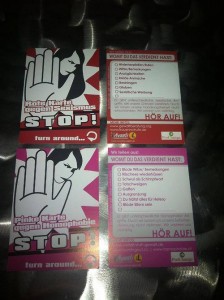Nov. 25 – Dec. 10 are the 16 Days of Activism Against Gender-Based Violence. To commemorate the week, we are featuring 1 activism idea per day. This information is excerpted from my new book Stop Global Street Harassment: Growing Activism Around the World (Praeger 2015).
Distributing cards about street harassment to harassers or to educate passersby is a tactic that’s been used for years, especially when it became easy to post the cards online for others to download. The Street Harassment Project, for example, has offered cards on its site since the early 2000s and Stop Street Harassment has made cards available since 2008. But in recent years, individuals have been creating their own. In 2012, for example, American Mirabelle Jones created “catcalling cards” with a phone number printed on them for women to give to men who won’t leave them alone. If the men call the number, they will hear pre-recorded messages from women telling harassers exactly what they think of them. On her Tumblr I Am Not an Object, she invites women to leave recordings and download the cards.

In Dortmund, Germany, the women in the feminist group ProChange devised another clever way to use cards. Living in a country that is obsessed with football (American soccer), they created “Red Cards” against sexism, “Pink Cards” against homophobia and “Purple Cards” of courage. Individuals can hand out these cards to challenge or commend others’ actions without having to directly talk to them. “This can be easier than having any other reaction,” the women told me. A group called Avanti had the same idea and had already created cards that they let ProChange adopt. ProChange also created special coasters with information about street harassment for the pubs, bars, and clubs of Dortmund.

One of their first distribution occurred during International Anti-Street Harassment Week 2012 when they handed out 2,000 of these cards and coasters. They have distributed thousands more since, often coinciding with specific days like Equal Pay Day, One Billion Rising (against gender violence), Frauenkampflag (Women’s Day), and Fahnentag (the International Day for the Elimination of Violence against Women).
“We get mostly positive feedback regarding the cards,” the group members informed me. “Even men approach us to ask for more cards they can give to their partners or daughters. Often people email us to ask for our cards. Our favorite story was when we were in front of the city hall distributing cards. It was too cold and only a few people passed by. An old grumpy-looking man approached us. He took one of the cards and looked at it. Then he shook everybody’s hands and thanked us for standing in the cold for women and girls.”
Help fund our work in 2016, donate to our end-of-year giving campaign!
